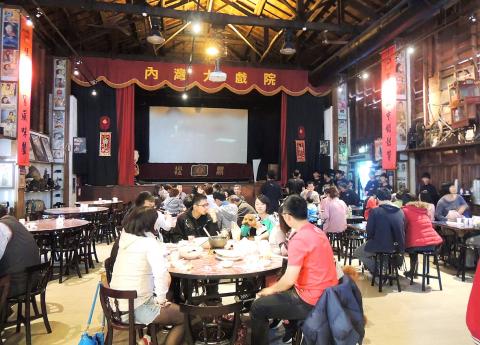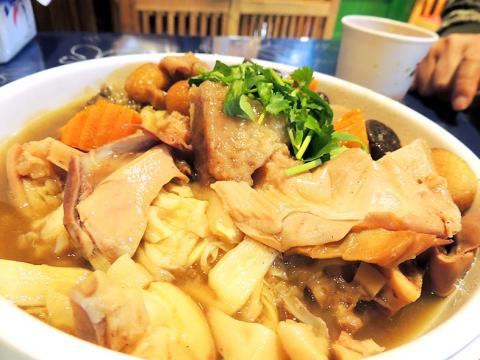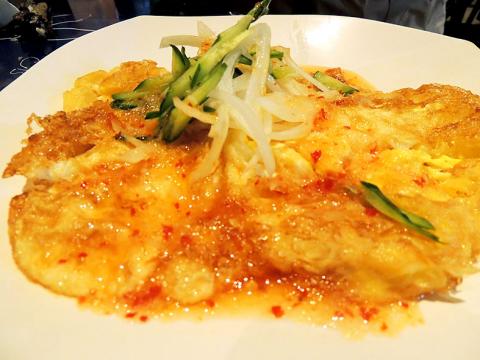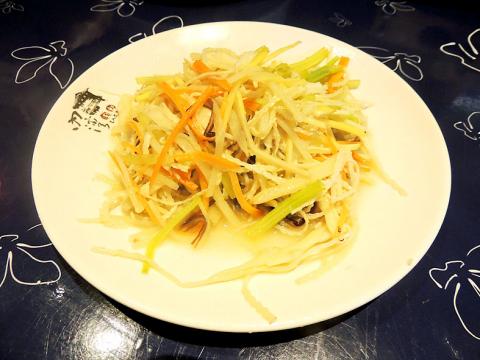Neiwan Theater is a rustic little spot in Hsinchu County that offers Hakka cuisine and a movie.
It’s an old two-story movie theater made of wood, devised without a single beam to prop up the ceiling. A soft light warms the brown walls. Instead of rows of seats, the ground floor and upstairs hold about 20 tables, but the essentials of the theater are still there — a working projector and a respectably wide screen hanging at the front of the room.
The screening schedule isn’t posted, so which old Taiwanese film you see is a matter of chance. Some days, you could get an appetite killer like The Kinmen Bombs (823炮戰). Today, it’s Charlie Chin (秦祥林) whispering to Brigitte Lin (林青霞) in Romance of Clouds (我是一片雲), a love story that quickened heartbeats in the 1970s.

Photo: Enru Lin, Taipei Times
To go with the film, Neiwan Theater offers about 50 hot dishes created by the local population. Neiwan is a former coal-mining village that today is home mainly to the Hakka people, whose cuisine can be identified by some touchstone adjectives: salty, aromatic, heavy on the oil, economical, creative and sparked up by pickles.
Perfection (十全十美, NT$250) is most of the above. It’s an everyday version of Buddha Jumps over the Wall, a Spring Festival dish that often includes top-shelf animal products like abalone and shark fin, and vegetables like ginseng and Japanese flower mushroom. Neiwan Theater’s humbler variant uses bamboo, taro, vermicelli noodles, bits of cured ham and pork tendon, which looks to be the priciest ingredient. Though without grandeur, each component appears to have been prepared the right way — slowly and separately — so that they are equally soft and redolent with oil. The broth is as saltily rich as the shark-fin version, and Perfection still feels like a feast dish.
Neiwan Theater is famous for its betel nut flowers (檳榔花), a NT$150 dish made with the creamy white tufts growing below the leaves of a betel nut tree. These flowers are crispy and pretty palatable, with a flavor like bamboo. They are stir-fried with shaved carrots, celery, onions and some kind of mushroom, served in a hot heap glazed with a thin and delicately saline layer of oil.

Photo: Enru Lin, Taipei Times
There is an army of young servers, notably all boys under 20, who form a line outside the kitchen, taking turns collecting a dish and dispatching it in a tidy flurry of industry. This means that with each dish, you meet a new server, who leaves as quickly as he arrives.
The strangest delivery was Egg Explosion (炸蛋開花, NT$150), which are fried eggs, dressed with chili sauce and served in slices like a pizza. The best was chicken soup with mesona (仙草雞湯, NT$150), which came last. This is roughly a quarter of wild chicken stewed with a handful of goji berries and dried mesona — a small thing that imparts a sweet minty freshness and transforms the broth from good to great.
Neiwan Theater also serves most of the familiar Hakka dishes such as salted pork (客家鹹豬肉, NT$150), oiled chicken (客家油雞腿, NT$200) and prawns steamed in a bamboo case (竹筒蝦, NT$200). Classic Hakka ingredients — available to buy at the street market outside the theater — make repeat occurrences on the menu. There’s a lot of white ginger lily, a fragrant flower with a slight cinnamon aftertaste, and some funky preserved vegetables that make an appearance in eggs, soup and meats.

Photo: Enru Lin, Taipei Times
These preparations are not the most exquisite or ingenious that Hakka cuisine has to offer, but they are better than popcorn. With the reel going, meals here can stretch to three hours or more.

Photo: Enru Lin, Taipei Times

Dissident artist Ai Weiwei’s (艾未未) famous return to the People’s Republic of China (PRC) has been overshadowed by the astonishing news of the latest arrests of senior military figures for “corruption,” but it is an interesting piece of news in its own right, though more for what Ai does not understand than for what he does. Ai simply lacks the reflective understanding that the loneliness and isolation he imagines are “European” are simply the joys of life as an expat. That goes both ways: “I love Taiwan!” say many still wet-behind-the-ears expats here, not realizing what they love is being an

Google unveiled an artificial intelligence tool Wednesday that its scientists said would help unravel the mysteries of the human genome — and could one day lead to new treatments for diseases. The deep learning model AlphaGenome was hailed by outside researchers as a “breakthrough” that would let scientists study and even simulate the roots of difficult-to-treat genetic diseases. While the first complete map of the human genome in 2003 “gave us the book of life, reading it remained a challenge,” Pushmeet Kohli, vice president of research at Google DeepMind, told journalists. “We have the text,” he said, which is a sequence of

Every now and then, even hardcore hikers like to sleep in, leave the heavy gear at home and just enjoy a relaxed half-day stroll in the mountains: no cold, no steep uphills, no pressure to walk a certain distance in a day. In the winter, the mild climate and lower elevations of the forests in Taiwan’s far south offer a number of easy escapes like this. A prime example is the river above Mudan Reservoir (牡丹水庫): with shallow water, gentle current, abundant wildlife and a complete lack of tourists, this walk is accessible to nearly everyone but still feels quite remote.

It’s a bold filmmaking choice to have a countdown clock on the screen for most of your movie. In the best-case scenario for a movie like Mercy, in which a Los Angeles detective has to prove his innocence to an artificial intelligence judge within said time limit, it heightens the tension. Who hasn’t gotten sweaty palms in, say, a Mission: Impossible movie when the bomb is ticking down and Tom Cruise still hasn’t cleared the building? Why not just extend it for the duration? Perhaps in a better movie it might have worked. Sadly in Mercy, it’s an ever-present reminder of just